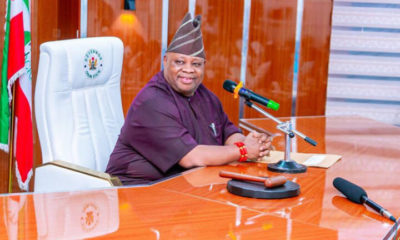NEWS
Adeleke Unveils Food Security Plan

Sequel to President Bola Ahmed Tinubu’s charge to state governors, Osun State’s Governor Ademola Adeleke has unveiled his government’s food security plan.
According to a government statement issued in Osogbo on Friday, he also advocated national unity to resolve the current national economic crisis.
It was gathered that Gov Adeleke was at the Federal Ministry of Agriculture on Thursday, where he opened up on the extensive agenda of the state government on food security and expanded food production.
He was received by the Federal Minister of Agriculture, Senator Abubakar Kyari.
Gov Adeleke said, “these are emergency eras in the economic life of this nation.
“We therefore have a duty to look and act beyond partisan politics and ensure collective efforts towards restoration of normalcy. A federation works best when component units join hands for common good.
“It is in that line that I am here today. The first reason is to brief you on what the Osun State government is doing on the issue of food security and ongoing economic challenges facing the nation.
“Mr President yesterday briefed the state governors on the state of the nation. He outlined several steps state governors should take to stem the crisis of food security and inflation.
“I am happy to report that the Osun government has been very proactive. First we are setting up a State Security Trust Fund to mobilise financing for security agencies. This is going to be private sector driven.
“Secondly, I have convened a food security meeting for Monday to brainstorm on how to further secure our farmlands. I will be meeting representatives of Hunters Association and the Amotekun Commanders alongside the civil defense and police services. The goal is to strengthen farm security.
“Our administration is also working on Small Farmers’ Equipment Lending service. This is to ease the access of small scale farmers to tractors and other needed machineries. We are meeting this week to finalise the plan ahead of the onset of the rainy planting season.
“To expand food production, we are also pushing to implement a City to Farm programme. This was designed to encourage young small scale farmers. This will expand production and also engage our youth.
“This is alongside our plans for a regional farmers’ markets where offtakers can meet farmers for exchange and market relationship.
We need your technical support to implement many of the listed areas.
“On a more general level, our administration recently unveiled a Cocoa Revival plan for the state. It involves several activities which focus on moving Osun from 3rd to 1st cocoa producer in Nigeria. We seek partnership with the federal Ministry of Agriculture on this.
“Our government is also interested in the livestock development programme. We have submitted our expression of interest. Kindly help to facilitate early approval.
“The state is also interested in the Agro-processing zones project being implemented under the African Development Bank. I hosted a delegation of the AFDB in Osun two weeks ago. Your ministry’s support on this is also solicited.
“Overall, I seek an MOU with the ministry to ensure standby collaboration with our government. I will be glad if we can have a small committee to ensure the making of the MOU.”
On his part, Senator Abubakar commended the multi-partisan approach of the Governor to state governance, pledging to work on all the areas touched by the Governor.
He restated the determination of President Tinubu to address the national economic challenges, informing the delegation that the meeting with the Governor was part of a broad plan to ensure immediate resolution of the current dislocations within the economy.
While describing the state governments as key partners in national economic development, the minister expressed happiness on the proactive measures listed by the Governor and assured him of federal support and assistance.
NEWS
Moghalu Prescribes Good Governance As Panacea To Ethnic Agitation

The President of the African School of Governance, Kingsley Chiedu Moghalu has admonished state actors against resorting to brutal force in the bid to muscle out separatist agitators.
In the aftermath of Mazi Simon Ekpa, the Finland based Biafran nationalist agitator being caught in legal web and the Nigerian government moving swiftly to seek his repatriation, the former deputy governor of the Central Bank of Nigeria (CBN) has cautioned that ‘We either fix our problems, or our problems will eventually “fix” us. No alternative to a renegotiated union.’
ALSO READ: Finnish Police Arrest Simon Ekpa Over Terror-Related Allegations
The political economist, while expressing his hope in Nigeria, made it clear that “hope is not a strategy”.
He bared his mind in a series of posts on his verified handle on micro-blogging site, X on Friday.
Moghalu wrote, “Despite sustained contemporary difficulties, I am hopeful about Nigeria. But hope is not a strategy. We need to improve state capacity for effective governance.
“We either fix our problems, or our problems will eventually “fix” us. No alternative to a renegotiated union.
“We must learn to be honest with ourselves and address the root causes of our problems. Why ignore them, when the problem is actually quite solvable? The problem with continuing with this approach is that when the danger crystallizes, those who thought they were benefiting from
NEWS
N1.7trn Loan: Atiku Blames NASS For Worsening Nigeria’s Debt Burden
Former Vice President, Atiku Abubakar has criticized the federal government’s plan to secure an additional N1.7 trillion loan through Eurobonds to cover a shortfall in the 2024 budget, describing the borrowing as unsustainable and harmful to Nigeria’s economy.
In a statement shared on Thursday via his X (formerly Twitter) handle, Atiku accused the Bola Tinubu-led administration of burdening Nigerians with debt while failing to provide clear answers about the country’s fiscal challenges.
READ ALSO: CSR: Dangote Cement Fuels Education With Support Projects At Lagos Schools
He also faulted the National Assembly for enabling what he called a “voracious appetite” for loans.
The former Peoples Democratic Party (PDP) presidential candidate expressed alarm over a recent World Bank report ranking Nigeria as the third most indebted country to the International Development Association (IDA), calling the development troubling.
“The recent report released by the World Bank, showing Nigeria as the third most indebted country to the International Development Association (IDA), is very concerning,” Atiku stated.
He raised further concerns about the government’s decision to benchmark the proposed loan at an exchange rate of 1 USD to N800, despite the Central Bank of Nigeria’s official rate being over N1,600.
“What makes this particular loan proposal even more concerning is that it is benchmarked at the exchange rate of 1 USD to N800, whereas the current exchange rate from the Central Bank of Nigeria stands at over N1,600 to 1 USD,” he said.
Atiku questioned the need for additional borrowing, given the government’s earlier claims of record-high revenue collection.
“In July this year, Tinubu boasted that the FIRS and Customs under his watch had collected all-time high revenues to finance the budget. Why are they still borrowing?” he said
He accused the government of a lack of transparency, describing the borrowing spree as detrimental to Nigerians already struggling under economic hardship.
“There is something that they are not telling Nigerians, even as they are being crushed by a combination of their failed trial-and-error policies and loan rackets.”
Atiku also referenced a report by BudgIT, a budget monitoring group, which criticized the 2024 budget for its inefficiencies.
He alleged that corruption, rather than infrastructure or development needs, was driving the government’s borrowing decisions.
“These loans are powered by corruption and not for infrastructure and development needs. This voracious appetite for humongous loans is deeply concerning,” he said.
Reflecting on Nigeria’s financial history, Atiku lamented the return to significant foreign indebtedness just years after former President Olusegun Obasanjo’s administration cleared the country’s debt.
“It is agonizing to see that just a few years after the Obasanjo administration took us out of foreign indebtedness, we are today back at the top spot in the same conundrum,” he stated.
He called for a more cautious approach to borrowing, urging the government to prioritize fiscal responsibility and transparency to avoid worsening Nigeria’s economic challenges.
International News
ICC Issues Arrest Warrants For Israeli Prime Minister Netanyahu, Others
The International Criminal Court (ICC) has taken a historic step, issuing arrest warrants for Israeli Prime Minister Benjamin Netanyahu and former Defense Minister Yoav Gallant.
The charges include crimes against humanity and war crimes allegedly committed during Israel’s recent assault on Gaza.
In a detailed statement, the ICC accused the Israeli leaders of “intentionally and knowingly depriving the civilian population in Gaza of objects indispensable to their survival, including food, water, and medicine and medical supplies, as well as fuel and electricity.”
READ MORE: Osun Govt Decries Attempted Murder Of Park Mgt Chairman By Police
The ICC’s move marks a significant escalation in international scrutiny of the Israeli-Palestinian conflict. Netanyahu and Gallant are alleged to have orchestrated policies that caused severe harm to the civilian population in Gaza, leading to widespread condemnation from human rights organizations.
Alongside the charges against Israeli officials, the ICC also issued an arrest warrant for Hamas military commander Mohammed Deif. Deif has long been a central figure in Hamas’s military operations. Israel’s military claims to have killed him in a July airstrike, although this has not been independently verified.
The warrants highlight growing calls for accountability amid the ongoing conflict in the region. The ICC’s actions are likely to provoke heated debate and may complicate diplomatic efforts aimed at resolving the crisis.
With the warrants issued, global attention now turns to how the international community will respond and whether any practical steps will be taken to enforce them.















